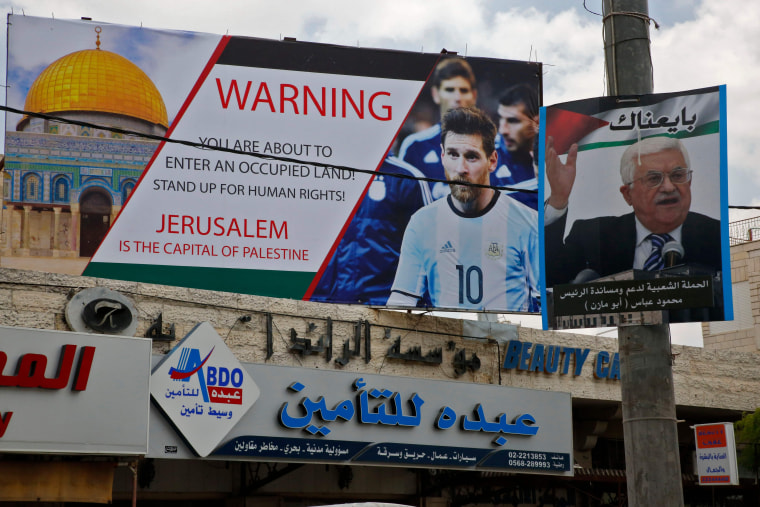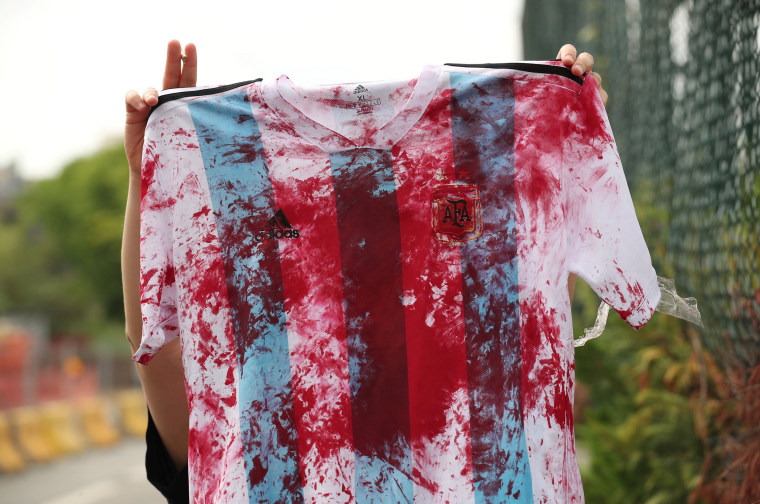JERUSALEM — Israel was in uproar Wednesday over Argentina's abrupt cancellation of a World Cup warm-up soccer match following pro-Palestinian protests, with some of the country's leaders accusing star Lionel Messi and his teammates of caving to terrorism.
The sold-out international exhibition match — or "friendly" — was scheduled for Saturday night at Jerusalem's Teddy Kollek Stadium.
But after a campaign, which included images of Argentina's white and sky-blue striped jersey stained with red paint resembling blood and threats to burn Messi posters, Argentina's football federation announced it was skipping the event.
"In the end, they've done right thing, and this is behind us," Argentina forward Gonzalo Higuain told ESPN. "Health and common sense come first. We felt that it wasn't right to go."

Prime Minister Benjamin Netanyahu called Argentine President Mauricio Macri and urged him to intervene, to no avail.
"It's unfortunate the soccer knights of Argentina did not withstand the pressure of the Israeli-hating inciters, whose only goal is to harm our basic right to self-defense and bring about the destruction of Israel," Defense Minister Avigdor Lieberman said. "We will not yield before a pack of anti-Semitic terrorist supporters."
Opposition figures, however, accused Israel's headline-seeking sports minister of bringing on the politicization of the sporting event by insisting on moving the game from Haifa to contested Jerusalem and by trying to orchestrate a politicized photo-op with Messi.
Palestinian groups had complained that the stadium is situated in a neighborhood built on the site of a former Palestinian village destroyed during the war surrounding Israel’s creation in 1948.
Opposition leader Yitzhak Herzog said the snub delivered victory to boycotters of the Jewish State.
The grassroots BDS movement advocates boycotts, divestment and sanctions against Israel in what supporters say is a way to promote Palestinian rights through nonviolent means. Israel says the campaign goes beyond Israeli occupation of lands claimed by the Palestinians and masks a deeper aim of delegitimizing or even destroying the country. It has formed a government ministry whose primary mission is to combat the boycott movement.
Israel has largely fended off the boycott campaign. Argentina's snubbing would appear to be the boycott movement's greatest achievement thus far.

The Palestinians celebrated the cancellation as a major triumph.
The head of the Palestinian football association, Jibril Rajoub, had called on Arab soccer fans to burn Messi posters if he participated. He has long tried to get soccer's world governing body, FIFA, and the International Olympic Committee to impose sanctions against Israel.
“The Palestinian FA thanks Argentina’s players led by star Messi for refusing to be used to serve a non-sporting goal,” Rajoub said after the decision was announced. “Values, morals and sport have secured a victory today and a red card was raised at Israel through the cancellation of the game.”
Rajoub also wrote to Claudio Tapia, the head of the Argentinian football association, last week accusing Israel of using the match as a "political tool."
Argentina has made four previous pre-World Cup stopovers in Israel since 1986.


